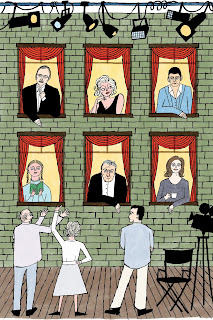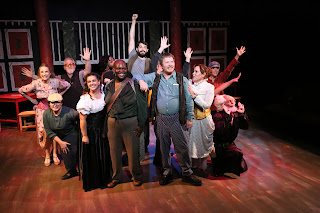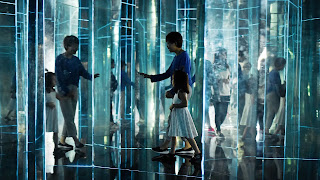Years ago, I was reading a book about musical theatre and I encountered the word "diegetic" for the first time. I could sort of understand what it meant from the context, but I had to look it up to really understand it.
Once I did, I couldn't believe I had lived that long without this incredibly helpful word. I quickly discovered that this term helps so much in talking about how our ridiculously complex art form of musical theatre works, particularly the
21st-century forms like
neo musical comedies and
neo rock musicals.
In 2014, I wrote a blog post about
musical theatre terms and their definitions, and this is what I wrote about the term "diegetic":
"Diegetic" is a label that describes music or a song that comes out of the world of the story, rather than from the language of the storytelling, music that both the audience
and the characters can hear.
Okay, maybe that's not all that clear. Usually in musicals, the characters are not aware they're singing. In
Spring Awakening, we're not supposed to believe that, inside this narrative, all these kids are actually singing in a circle around the couple having sex. Or in
Guys and Dolls, when Nathan and Adelaide sing the hilarious fight-song "Sue Me," inside the reality of the story, the characters are not
singing their fight on the street; they don't hear it as singing. We only hear it as singing because a musical is telling this story. Singing is just the language of the storytelling, the same way that
iambic pentameter is the language of
Shakespeare's plays.
But sometimes, the music is actually organic inside the story. For example, in
Cabaret, many of the songs are being performed in the Kit Kat Klub, and all the characters are aware that they're singing. Likewise in
Rent, when Roger plays and sings "Your Eyes," all the characters know he's singing. Same with Angel's "Today 4 U," and also "We Love You Conrad" in
Bye Bye Birdie, "Be Like the Bluebird" in
Anything Goes, "Sing" and "One" in
A Chorus Line, "The Parlor Songs" in
Sweeney Todd, and "Nicest Kids in Town" in
Hairspray. These are all diegetic numbers. The music comes from inside the story.
One essay I read put it this way: Music that the characters can hear is diegetic (for example, a song playing on a car stereo); music that only the audience can hear is extra-diegetic or "mimetic" (for example the orchestral score to a movie). Most early
movie musicals used only diegetic music, club numbers, auditions, other performances. You can see how useful this term is since so many musicals mix and match diegetic and mimetic.
But there's a further wrinkle.
Especially in the concept musicals and
neo musical comedies of this new millennium, there are two kinds of narration. There is extra-diegetic narration, in which the (usually omniscient) narrator stands outside the story and recounts it for us, like the adult Alison in
Fun Home, Stew in
Passing Strange, the narrator in
Into the Woods, and the criminologist in
The Rocky Horror Show. But there are also intra-diegetic narrators, who tell the story from inside the story, like Officer Lockstock and Little Sally in
Urinetown, Rob Gordon in
High Fidelity, President Jackson in
Bloody Bloody Andrew Jackson, and the whole cast of
Come From Away.
This second type is a tough tightrope for actors, being
both character and narrator, existing
both inside the action
and in this theatre tonight with this audience,
at the same time. But audiences instinctually understand it and accept it.
As it is in every other respect,
Something Rotten! is an unusually complicated "mental mindfuck" when it comes to all this. In the opening number, the whole cast are intra-diegetic narrators, existing both in London in 1595
and in this theatre tonight telling us this story. But that by itself wouldn't be so mind-blowing; the evil geniuses who wrote this show went way deeper and further. The shining example of their intellectual hijinks is the song "It's a Musical."
The real brilliance here is that all the humor in the song relies on the audience's previous knowledge of musical theatre conventions, as well as specific musicals. Without the knowledge the audience brings in with them, the song isn't funny.
That's a neat trick!
"It's a Musical" is is set up with dialogue that's funny on so many layers.
Nostradamus: Whoa! What spectacle! I have seen the future!
Nick: What, what is it??!
Nostradamus: The biggest, most fantastic thing in theater will be... MUSICALS!
Nick: What?
Nostradamus: Musicals!
Nick: What the hell are musicals?
Nostradamus: It appears to be a play where the dialogue stops And the plot is conveyed through song.
Nick: Through song?
Nostradamus: Yes.
Nick: Wait, so an actor is saying his lines and out of nowhere he just starts singing?
Nostradamus: Yes.
Nick: Well that is the...
(Singing) Stupidest thing that I have ever heard!
You're doing a play,
Got something to say,
So you sing it?
It's absurd!
Who on earth is going to sit there
While an actor breaks into song?
And what possible thought
Could the audience think
Other than "This is horribly wrong"?
The writers have pulled off several tricks here. First, they've set up a situation in which the audience knows far more than any of the characters do, which is always fun in a comedy. Second, they are establishing that Nostradamus
can see the future, just not very
well; and our previous knowledge shows us just how much he gets wrong and how much he gets
right. Third, they're literally describing what they themselves are doing in real time -- and disparaging it! Fourth, it reminds the audience just how weird and arbitrary the rules and conventions of musicals are, which we all accept without even thinking about it. And Fifth, traditional musical theatre has always tried to smooth over the transition from speaking to singing, to make it as seamless, as "natural" as possible, often using
underscoring to ease us into a musical number -- but this intentionally makes it comically, freakishly obvious.
Then, responding to Nick's question about the audience...
Nostradamus: Remarkably, they won't think that.
Nick: Why not?
Nostradamus replies in song, "'Cause it's a musical..." and the song is off and running. The jokes and references come so fast and furiously that we don't notice his wacky, circular, but weirdly insightful logic: Audiences don't mind the odd conventions of muiscals
because they are musicals.
And once again, we're both inside and outside the story at the same time. Nostradamus is explaining all this to Nick as part of the plot. But also,
they're talking about us! They're inviting us to laugh at our own automatic agreement to accept some very strange conventions. And why do we accept them? Because "Nothing's as amazing as a musical!" On the surface, he's telling us we like musicals precisely because of their conventions (song, dance, etc.), but he's also remarking on the crazy complexity of our art form, and how amazing it is that we all so readily
accept all these incredibly unnatural conventions.
And as Nostradamus proceeds to describe what musicals are, how they work, examples of them, etc., we in the audience are reminded over and over and over that we recognize a
lot of famous musicals, as the song spews forth dozens of references, both textual and musical, to other stage musicals. Some of the references are really short and fly by at high speed, and yet audiences still get them. There's a one-measure musical quote of "Hey Big Spender!" and every night it gets a laugh.
But why does the audience's recognition of the references elicit laughter? They laugh because there are
so many references, and they recognize how universal many of them are. Even people who don't know musicals very well can recognize many of these iconic textual and musical phrases. And some of us laugh because we can't believe we catch so many, even the almost hidden, one-measure, musical quote of "Putting It Together."
All comedy is a surprise and tells the truth. "It's a Musical" is one surprise after another, because musicals aren't supposed to talk about musicals this much -- especially from a faux "outsider" point of view. But also, everything Nostradamus explains about musicals is true, and we know it. As they do the song, we are being entertained in exactly the way Nostradamus is explaining.
In the middle of the number, Nostradamus deconstructs the "dance break":
Nick: What the hell are you doing now?
Nostradamus: It’s called a “dance break.” Apparently, this happens in musicals as well. People on stage, just bursting into spontaneous dance!
Nick: Why? Does it advance the plot?
Nostradamus: No.
Nick: Develop character?
Nostradamus: Nope!
Nick: Then why do it?
Nostradamus: Because -- IT’S ENTERTAINING! 5, 6, 7, 8!
Annnnd there's a big dance break. Now, of course, in some musicals, dance very much advances plot and/or character. But the funny part here is that, in this case, dance really
does advance the plot, because Nick needs this information in order to proceed with his plan. This quick exchange sets us up for the insanely funny dance breaks in
Omelette the Musical.
The extra-ironic part of "It's a Musical" is that the song celebrates musicals, but even more specifically, it pretends to celebrate simple, breezy, brainless musicals -- which is exactly the opposite of the high-concept, intellectual tomfoolery of
Something Rotten! After all, this show is relentlessly silly, but it's also deeply human, and it's one of the most
intellectual and literate musicals in the last twenty years.
All this self-awareness and all these outside references are
meta-theatrical devices, which remind us of the
act of storytelling alongside the story itself. Some musicals indulge in meta jokes because the writers think it's funny, and they know it's
an easy laugh. Some musicals use
meta devices as an organic part of the story. Shows like
Urinetown, Bat Boy, Chicago, Passing Strange, and others are built on the dissonance and resonance between the story and the storytelling. In
Chicago, each number and each scene are presented as
vaudeville acts, to make literal the central theme that America makes crime into entertainment. Likewise, with
The Scottsboro Boys, we're watching a minstrel show, a racist storytelling form, which tells us an horrific real-world story of racial injustice. The form of its storytelling -- and its shame -- is part of the point of the show.
In
Something Rotten!,
the whole premise is built on the act of looking into the future of theatre, but from the point of view of 1595. So their "future" of theatre is our "present." The future audience that Nostradamus sees is
us. Though the device is inherently funny, here it's also
dramatic -- it's the terrible mistake Nick makes that causes
all his troubles. He "cheats" by trying to "steal" future success. He values commercial success over personal and artistic success, and he pays a great price for it.
But wait... that's only half the magic trick our writers have pulled off with this show. They also indulge in all this same meta playfulness with Shakespeare's plays and the conventions of Elizabethan theatre, once again relying on our previous cultural knowledge.
It's an artistic BOGO.
The original production of
Something Rotten! was funny, but it was so chock full of sight gags and other pointless schtick, that all that shallow crap overshadowed much of what's exciting and original about this material. In New Line's production, minus the sight gags, minus the schtick, our audiences tell me every night that they think the show is
funnier this way than it was on Broadway and on tour, and not surprisingly, more emotionally engaging.
On Broadway, director Casey Nicholaw asked himself,
How can I make this funny? Here at New Line, we just asked,
How can we most clearly tell this wonderful, funny, human story? Big difference.
Long Live the Musical!
Scott
P.S. Single tickets are
on sale now. For more info about the show,
click here.
P.P.S. To check out my newest musical theatre books,
click here.






























